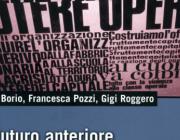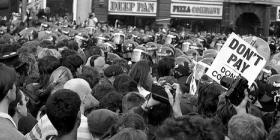Seven theses on workers' control - Raniero Panzieri and Lucio Libertini
1958 article on workers' control, from an autonomist Marxist perspective.
Definição de composição de classe - Zerowork
Uma definição, hoje clássica, de "composição de classe".
Notas sobre composição de classe - Kolinko
Texto do grupo comunista libertário alemão Kolinko, abordando a atualidade e importância do conceito de composição de classe.
A rede de lutas na Itália - Romano Alquati
Exposição do conceito de composição de classe, ferramenta teórica e prática que visa favorecer o movimento autônomo do proletariado. Partindo das conexões materiais e sociais (geográficas, produtivas, educativas, subjetivas...) colocadas pela classe capitalista, o proletariado cria suas próprias conexões, sua própria autonomia de classe, podendo se tornar capaz de se opor ao capital num nível mais radical.
Back to the future: Italian Workerists reflect upon the Operaista project - Steve Wright
Drawing upon the transcripts used in a book consisting of interviews of people involved in the Italian operaismo and autonomia movements, Steve Wright explores issues and debates around immaterial labour and post-Fordism, to the nature of subjectivity and the role of workers’ enquiries and co-research.
Communism: some thoughts on the concept and practice - Antonio Negri
Thoughts on communism by autonomist Marxist Antonio Negri, first presented at the expensive conference on the Idea of communism in London, March 2009. Translation by Arianna Bove.
Science and Dogma: The Marxist Perspective
An introduction to the Marxian approach to science and ideology.
The Social Theories of Karl Marx in the Twenty-First Century
This essay was inspired, on the one hand, by the growing interest in Marxism along with the proportional ignorance of the real nature of the movement; and on the other by the scarcity of accurate, relatively approachable, and contemporary introductions to the subject. It is written with the intended audience of any intelligent and curious reader, and I have attempted to avoid technical language and jargon as much as possible. The piece is meant to present not only the essential content of Historical Materialism, but indicate to what extent the theory is still useful to us today, as a resource for anyone seeking to understand Marx’s contribution to science and the revolutionary movement.






 Can comment on articles and discussions
Can comment on articles and discussions